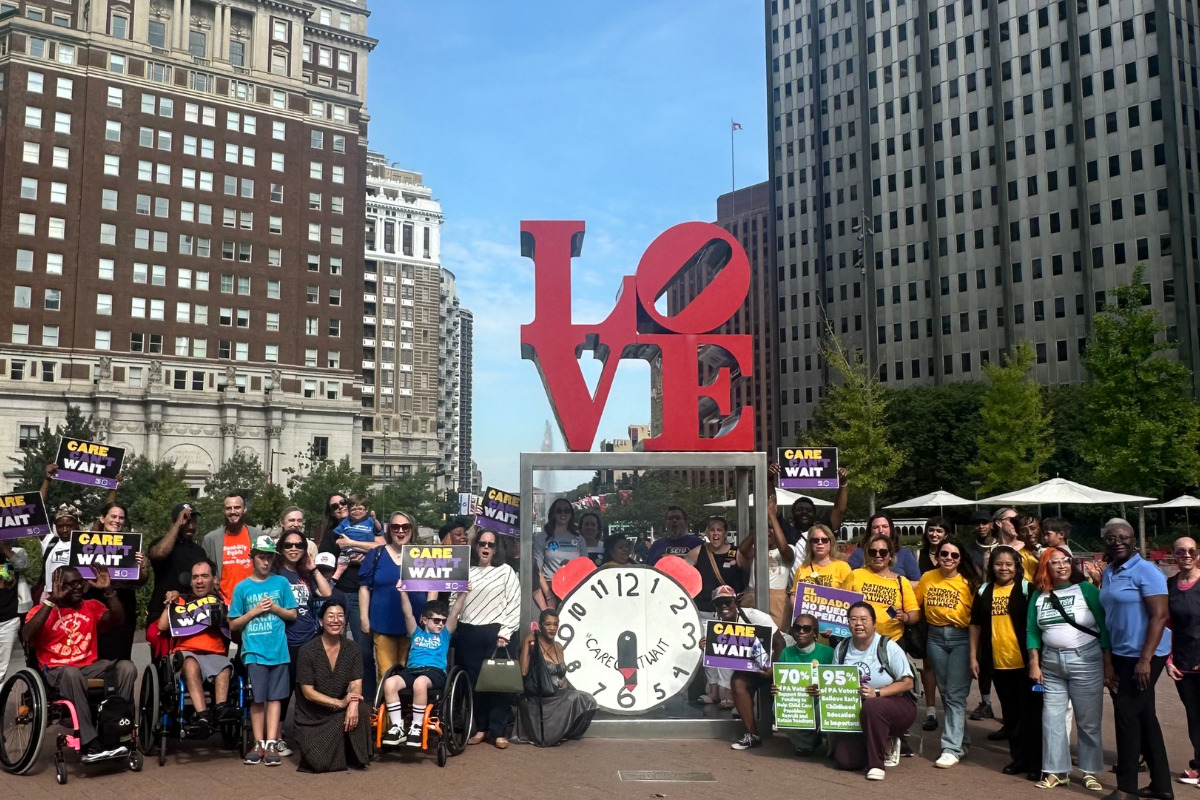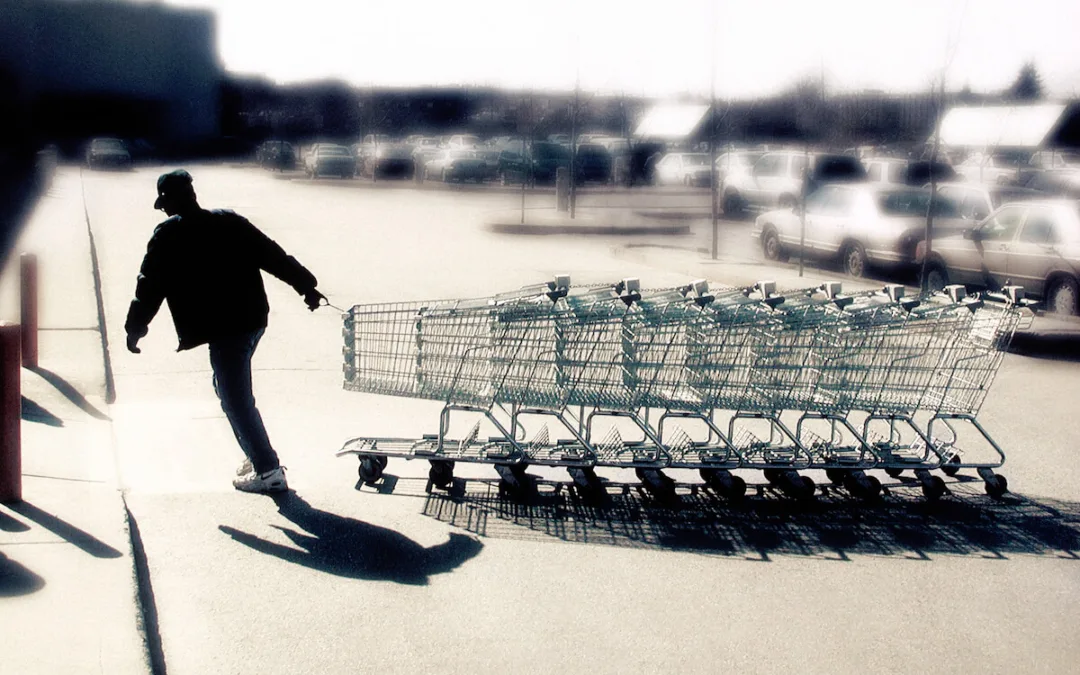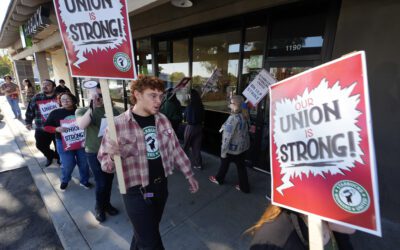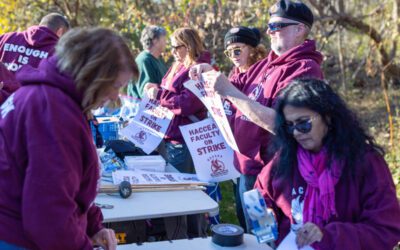
"Care Can't Wait" Tour Bus participants standing together to take a photo in front of the famous "Love" sign in Philadelphia on Aug 28, 2024. The tour includes: Caring Across Generations, MomsRising, National Domestic Workers Alliance, AFSCME, SEIU, First Up PA, The Arc of Philadelphia. (Photo: Jessica Sass)
While caregivers may be some of the most important workers in a functioning community, taking care of children and the elderly when family members can’t, their pay and respect often don’t match up with their contributions. And yet still, the cost to individuals and parents who don’t have paid leave or care benefits from their employer to make use of their services can be daunting.
A growing coalition of Pennsylvania organizations and advocates are pushing for a bigger focus from elected officials on strengthening the caregiving profession and help families better afford it.
“Care has always been fundamental to the economy,” said Ai-Jen Poo, President of the National Domestic Workers Alliance and Executive Director of Caring Across Generations during a recent event in Philadelphia. “We consider care work the work that makes all other work possible.”
Poo explains this essential labor, which is performed mostly by women and especially women of color, has been overlooked, undervalued and underpaid for too long.
Improved access to affordable care, higher wages for childcare workers, adult caregivers, homecare workers and teachers was the focus of Care on Tour, a national coalition dedicated to promoting affordable and accessible care across the country. Together with Caring Across Generations, MomsRising, the National Domestic Workers Alliance, AFSCME, First Up PA, and The Arc of Philadelphia, Care on Tour was recently hosted by Love Park for their Philadelphia stop.
Nearly two-thirds of residents in Pennsylvania lack access to paid family and medical leave from their employers. In this state, about 1.5 million family caregivers are unpaid when caring for their loved ones. On average, these caregivers have annual out-of-pocket costs of more than $7,000 annually.
The average cost of center-based child care for a toddler was $11,346 in 2020-2021, consuming 35% of a single parent’s median income. The childcare crisis also costs the state $6.65 billion annually in lost earnings, productivity, and revenue, according to ReadyNation. On a national scale, this results in families losing over $22 billion annually in wages due to lack of care and paid family and medical leave.
Under the Biden-Harris administration, care was placed at the center of the national agenda. The Build Back Better Act promised to invest in caregiving infrastructure—childcare, paid leave, and support for care workers. But these measures failed in the Senate due to Republican opposition, leaving millions of Americans scrambling to balance work and care. As Poo puts it, “These policies have to be at the forefront of our future.”
Nicole Jorwic, chief of advocacy and campaigns at Caring Across Generations, underscored the urgency.
“Family caregivers need investments in paid leave, childcare, aging and disability care, and good pay for care workers,” she said. “This is the unfinished business when it comes to the strength of America’s families.”
State Representative and parent of young children Elizabeth Fielder added, “Care can’t wait. This is a human issue, an educational issue, and an economic issue.”
Leaders fighting for better care agree that caregiving is a universal issue that transcends party lines, requiring bipartisan support in the upcoming election to address caregiving infrastructure as a reality in everyone’s lives.
At the Love Park event, Meghann Luczkowski and her son Miles advocated for better caregiver support with Little Lobbyists. Luczkowski’s son needs around-the-clock care from skilled nurses, yet “that care structure has been antiquated for far too long.” Supporting caregivers is essential because everyone will either need care or provide it at some point in their lives.
Luzkowski urges candidates and voters to consider how caregiving affects families and the economy, and to prioritize it in their votes and actions.
“It’s the work of home care workers and personal care attendants that makes it possible for literally 53 million working family caregivers to go to work in every sector of the economy every single day,” says Poo.
Care jobs, including home care, are among the fastest-growing in the U.S. economy. With 10,000 people turning 65 every day and advances in medicine allowing people to live longer, the demand for care is exploding, according to the Executive Director of First Up. But instead of being recognized as the essential work it is, care is still treated as low-wage labor. This November, the stakes are high, and the consequences of inaction are personal.
“This isn’t about one party or another or one set of communities or interests at all,” Poo said. “This is one of the rare issues that truly unites Americans across race, class, geography, and political affiliation, and these policies have to be at the forefront of our future.”

Pittsburgh Post-Gazette ceases operations in order to break union
The Pittsburgh Post-Gazette owners’ decision to cease operations on May 3, 2026, comes after the US Supreme Court denied their appeal to stay a...

Will labor unions propel Josh Shapiro to reelection victory?
Labor leaders remain optimistic that Gov. Josh Shapiro will be able to once again win Pennsylvania’s union voters at a time when Democrats have...

New year, same wage: Pa. retains minimum wage despite 19 states seeking an increase
Pennsylvania Democrats hope that flipping the Pennsylvania Senate in November will finally bring a resolution to the minimum wage debate. Nineteen...

5 takeaways from Pa. billionaire Jeffrey Yass’ Washington Post interview
Jeffrey Yass shared a lot of his personal motivations in an interview and revealed what drives his political views. Pennsylvania’s richest...

Dozens of cities, states hiking minimum wages in 2026 amid federal inaction (but not in Pa.)
Pennsylvania’s minimum wage is at $7.25 per hour and has not increased since 2008. The minimum wage for workers will increase in 19 states and 49...





